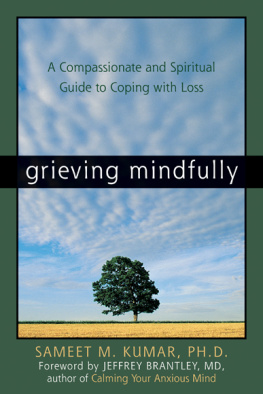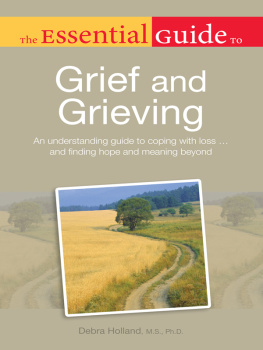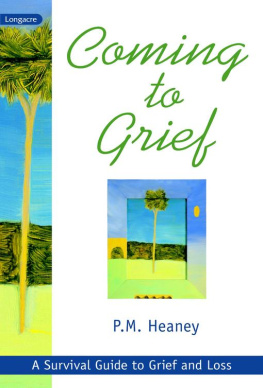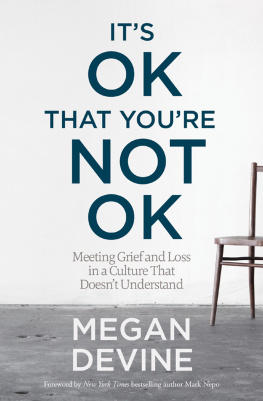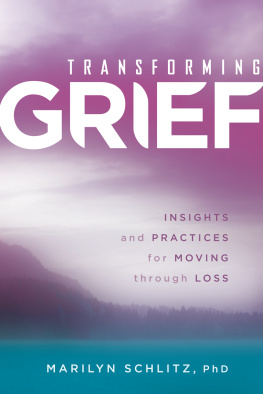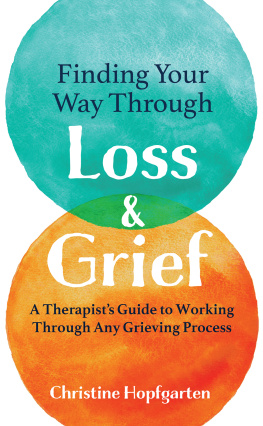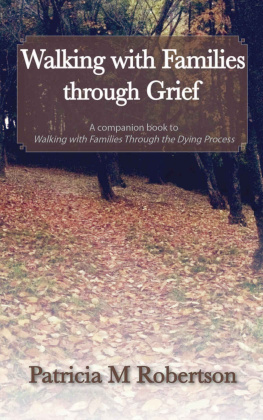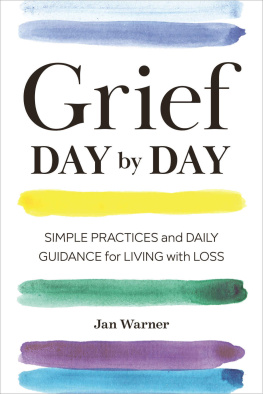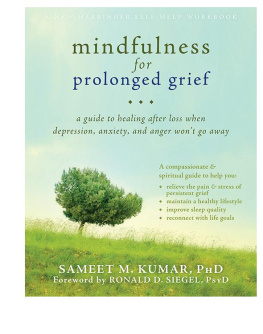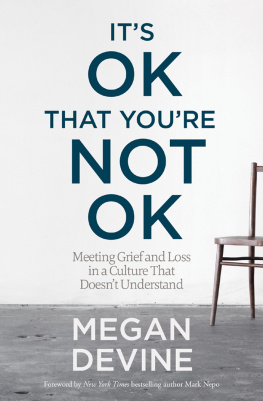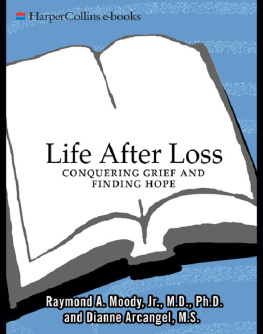
Grieving Mindfully
Sameet Kumar
New Harbinger Publications
Grief and loss are dreaded experiences that many wish to either avoid or to rapidly solve. In Grieving Mindfully, Kumar offers the alternative of welcoming the experience as an opportunity to develop our humanity. This book offers a path to healthy grieving for people encountering losses of many kinds.
Richard Tedeschi, Ph.D., professor of psychology at the University of North Carolina at Charlotte
Kumars approach to dealing with grief and loss is creative and radically transformative. Drawing on his experience as a practicing psychologist and his training in the Buddhist enlightenment tradition, he suggests that instead of hiding from our grief, trying to forget or get over it, we take a more demanding and rewarding pathwalking straight through grief with mindful awareness, fearless observance, and profound compassion. His book has the potential to bring strength and healing to the millions who grieve and to revolutionize the approach of psychologists and counselors working with those in profound grief.
Glenn H Mullin, Buddhist meditation teacher and author of Living in the Face of Death: The Tibetan Tradition
Publishers Note
This publication is designed to provide accurate and authoritative information in regard to the subject matter covered. It is sold with the understanding that the publisher is not engaged in rendering psychological, financial, legal, or other professional services. If expert assistance or counseling is needed, the services of a competent professional should be sought.
Excerpt on page 24 and 34 Sarah Harding and Khenchen Thrangu Rinpoche, 1996, 2002. Excerpted from Creation and Completion: Essential Points of Tantric Meditation with permission of Wisdom Publications, 199 Elm St., Somerville, MA 02144, U.S.A., www.wisdompubs.org.
Excerpt on page 60 from The Way of the Bodhisattva by Shantideva, translated by the Padmakara Translation Group. 1997 by the Padmakara Translation Group. Reprinted by arrangement with Shambhala Publications, Inc., Boston, www.shambhala.com.
Excerpt on page 19 Shaykh Tosun Bayrak al-Jerrahi al-Halveti, from The Name and the Named: The Divine Attributes of God, with permiassion of Fons Vitae, Louisville, KY.
Copyright 2005 by Sameet Kumar
New Harbinger Publications, Inc.
5674 Shattuck Avenue
Oakland, CA 94609
Cover design by Amy Shoup
Acquired by Tesilya Hanauer
Edited by Karen ODonnell Stein
Text design by Tracy Marie Carlson
ISBN 1-57224-401-1 Paperback
ISBN-13 978-1-60882-425-0 ePub
Library of Congress Cataloging in Publication Data on file
Distributed in Canada by Raincoast Books
All Rights Reserved
New Harbinger Publications Web site address: www.newharbinger.com
I would like to dedicate this book to all of my patients and clients over the years, who have taught me so much about grief, loss, suffering, and the positive potential of being human. It is a privilege to know so many people capable of such deep caring and love for each other. You all renew my faith in humanity each day.
In this book, I have tried to communicate some of my own understanding of the Dharma, but in the end I am only a beginner, and the Dharma is vast. I beg the reader to overlook my errors. May this incomplete work, with all of its faults and shortcomings, be of assistance in easing the suffering of all beings everywhere.
Sarve mangalam.
Contents
I am happy and honored to introduce Sameet Kumar and this book, Grieving Mindfully. In these pages, Sameet brings together a wealth of experience from the field of grief counseling and from his long-standing and dedicated personal practice of mindfulness meditation. He writes in a comprehensive yet inviting way, with warmth, humor, and great compassion. Most of all, Sameet offers an encouraging sense of hope when facing our own grief and loss. For the hope, I am especially grateful.
To be human is to be subject to the pain of loss and grief. The death of a loved one only heightens our remembrance of all the occasions and sources of loss throughout our lives. Whether it is the loss of a pet in childhood, good friends moving away, or the occurrence of illness in our own body, there is a real and deeply felt sense of grief connected to so many experiences.
Grief can be as unpredictable as it is intense. As a young psychiatry resident, I received a call from my mother informing me that her mother, my grandmother, had died from a sudden heart attack. Immediately on hearing the news, I noticed a numbing feeling beginning in my feet and moving upward through my entire body. After a few moments it was as if I were disconnected from my body, but could still hear my mothers voice on the other end of the phone. I felt disoriented and confused and could not explain why that reaction had occurred in me. I had no control over the reaction. Nothing like that had ever happened to me before, and has not since.
The experience of grief challenges our deepest sense of who we are. Without help and wisdom we can find ourselves severely and chronically disrupted by the reactions of fear, anger, and isolation arising from grief. Our sense of connection with life itself can seem to disappear.
Yet, though overwhelmed by the great upset of grief, we have a choice about how to respond. We can turn away from our own deep pain, seeking relief from distraction, numbing, and denial. Or we can turn toward the pain with compassionate attention and a willingness to allow what we are feeling to be just as it is.
Mindfulness enables us to turn toward the grief process and connect with the experience as it unfolds. As Sameet clearly advises, it is in connecting mindfully, even to painful experiences like grief, that the potential for transforming and enriching our lives exists.
Mindfulness is available to each of us. It is a basic human capacity. Mindfulness is an awareness that arises as we pay attention on purpose, nonjudgmentally, to unfolding experience in the present moment. The way of paying attention is crucial. Mindfulness is sensitive, warm, friendly, compassionate, and allowing. Mindful attention does not try to change what is happening. Instead, it reflects accurately and precisely. Being mindful means being a witness to, and connecting consciously with, whatever elements of our life that are present now, in this moment.
Being mindful, we become the observers and experiencers of life, rather than its victims. We become witnesses to the ever-changing flow of the inner life instead of being carried away by the currents of our minds or the reactions of our bodies.
Grieving Mindfully introduces ancient and effective mindfulness practices and encourages us to use them to become more mindful of inner life as the grief process unfolds. We are also encouraged to become more mindful of the outer and everyday activities of living. Getting to know life and the process of grief through mindfulness is crucial to the healing and transformation of the grief.
Through mindful attention, we discover the fact that grief is not who we are. Grief is not an identity. What feels so solid and real as a grief reaction (or any other reaction) in any moment is merely a combination of powerful reactive habits of thinking, feeling, and physical sensations. Learning to inhabit our awareness and deepen its scope by practicing mindfulness enables us to experience how much larger and more vibrant we actually arebeyond any experience or upset, even grief. And, by inhabiting each moment with compassionate awareness, we discover how capable we are of containing and healing the grief we carry.
Next page
